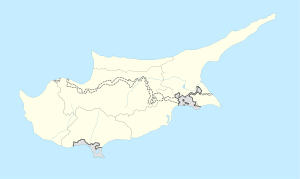Geroskipou
| Geroskipou | ||
|---|---|---|
 |
||
|
||
| Location in Cyprus | ||
| Coordinates: 34°46′N 32°28′E / 34.767°N 32.467°ECoordinates: 34°46′N 32°28′E / 34.767°N 32.467°E | ||
| Country |
|
|
| District | Paphos District | |
| Population (2011) | ||
| • Total | 8,313 | |
| Time zone | EET (UTC+2) | |
| • Summer (DST) | EEST (UTC+3) | |
| Postal code | 8200 | |
| Website | http://www.geroskipou-municipality.com | |
Geroskipou (Greek: Γεροσκήπου; Turkish: Yeroşibu) is a coastal town in Cyprus, east of Paphos. Its current population is approximately 7,000 and it is the second largest municipality in the Paphos District. Yeroskipou, with its remarkable five-domed Byzantine church of Agia Paraskevi, and its Folk Art Museum, is a popular tourist destination. It is known especially for the production of Turkish Delight or "lokum" (locally loukoumia or lukum). The town is the only place in the world which has protected geographical indication (PGI) for the popular dessert.
According to local tradition, and as is implied in the etymology of the town's name, Yeroskipou was the site, in Greek mythology, of goddess Aphrodite's sacred gardens. Hence its name — "yeros" (ιερός, holy) and "kipou" (from κήπος, garden) — means "holy garden". Ancient pilgrims from Nea Paphos passed through Yeroskipou before reaching the temple of Aphrodite at Kouklia.
The Classical writer Strabo mentions Yeroskipou, calling the settlement Hierokepis. Many other travellers have written that in the coastal plain of Yeroskipou there were centuries old olives and carob trees.
In the 11th century, the five-domed Byzantine church of Agia Paraskevi was built in the middle of present-day settlement. It is also mentioned that at Moulia, a coastal locality of the town, the miraculous icon of Panagia of Khrysorogiatissa was found by the monk Ignatios, who carried it to Rogia mountain from where the monastery took its name.
In 1811 Sir Sidney visited Yeroskipou and met Andreas Zimboulakis, appointing him as a vice-consul of Britain. Zimboulaki, who was born in Kefalonia, settled in Yeroskipou and his duties as vice-consul were to protect the interests of Britain. The house of Zimboulaki where many personalities were hosted, was bought in 1947 by the Department of Antiquities, to be converted into Folk Art Museum.
...
Wikipedia


